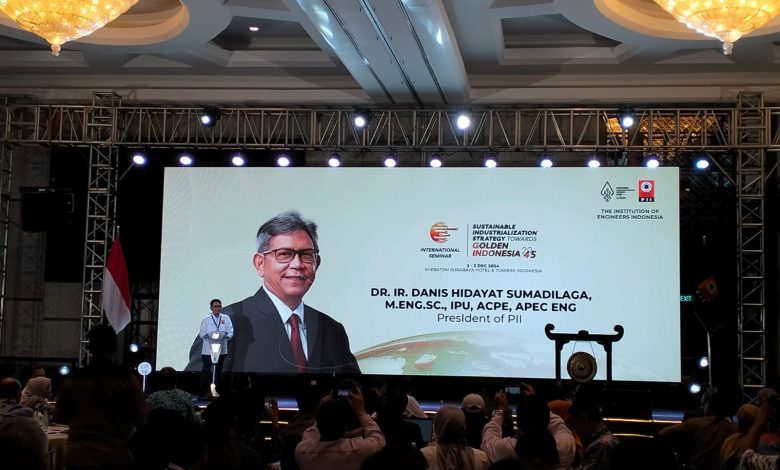
PII Holds International Seminar, Sustainable Industrialization Strategy Towards a Golden Indonesia
The Indonesian Engineers Association (PII) is holding an international seminar entitled "Sustainable Industrialization Strategy Towards a Golden Indonesia 2045".
The seminar is a series of activities at the XXIII PII Congress which will take place in Yogyakarta, 5-6 December 2024. PII's management will also end in December 2024, and at the XXIII PII Congress in Yogyakarta, the Deputy General Chairperson of PII will be appointed, who will become the next General Chairperson of PII 3 years later.
In his speech, PII General Chair Dr. Ir. Danis Hidayat Sumadilaga, M.Eng. Sc, IPU, ACPE, APEC Eng, said that in accordance with Law no. 17 of 2007, this December (2024) the 2005-2025 National Long Term Development Plan (RPJP) will end.
"As we are aware that our national long-term development plan ends in 2025. For this reason, to ensure the sustainability and continuity of national development planning, the 2025-2045 National RPJP is needed, which is the legal basis for the National RPJM, which in turn is the Regional RPM, Ministry Strategic Plan and RKPU," said Danis in his speech, at the Sheraton Hotel, Surabaya, Monday, (02/12/2024).
He said the national RPJP 2025-2045 had been established through Law No. 59 of 2024, namely realizing the vision of a Golden Indonesia 2045, namely Indonesia as a united, sovereign, advanced and sustainable Republic of Indonesia.

One very important theme is industrialization transformation, namely the downstreaming of superior natural resource-based industries, skilled labor-intensive industries, technology- and innovation-intensive industries. To achieve this, there are four stages that will be carried out, including: The first stage, 2025-2029, will carry out the expansion of the industrialization ecosystem. The second stage, namely 2030-2034, will strengthen the complexity of industrial products. The third stage, namely 2035-2039, is strengthening industrial competitiveness towards global expansion. Furthermore, in 2040-2045 Indonesia is expected to become the manufacturing world.
“Reflecting on the 2005-2025 National RPJP, Indonesia has achieved significant progress in various areas of development. However, as a large archipelagic country, Indonesia is still lagging behind in utilizing the enormous potential of its resources and energy. "For this reason, Indonesian engineers must work hard to overcome various development problems," explained Danis before the participants of the PII International Seminar which was also attended by the Acting Governor of East Java, Adhy Karyono.

Danis said that the productive sector, which is the key to achieving high economic growth, is currently still relatively low and even tends to decline. This is related to one of them, namely the quality of human resources (HR), which is related to innovation research and infrastructure capacity.
"The 2024 PII international seminar is an effort to collaborate on the results of research and innovation, in order to increase the resilience of human resource capacity," said Danis.
According to him, the manufacturing sector of the national GDP structure makes a quite significant contribution. However, currently the manufacturing sector is experiencing a decline or deindustrialization of around 27.4% in 2005 to 18.3% in 2022. The cause of the decline in GDP contribution is the weakness of the manufacturing sector, as well as low productivity, production performance and other things, for example related to logistics and interest rates. .
He continued, then new renewable energy in the national energy mix continues to increase, from 4.4% in 2005 to 12.3% in 2022. However, this shows that the high level of energy based on fossil fuels is still high.
"The energy transition is expected to strengthen the use of new, renewable energy sourced from wind energy and ocean currents, to improve the electricity generation mix. The use of EBT is predicted to become the main source in the world. "EBT technology will become very competitive in the future," he said.

Face the Challenges of the Times
It cannot be denied that in the future Indonesian engineers in particular will face various kinds of extraordinary changes and this must be anticipated by engineers.
Such as the technological revolution, demographic changes, climate change, quality sales dynamics, and GEO economics.
This change affects various aspects of life including social, cultural, economic, and demands rapid adaptation and innovation from all of us.
"I hope that through this Seminar all Indonesian Engineers will produce strategies for sustainable realization in realizing a golden Indonesia 2045. We can convey this strategy to the government," he concluded.
Request A Call Back
Ever find yourself staring at your computer screen a good consulting slogan to come to mind? Oftentimes.










